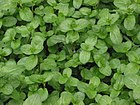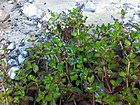Note: This is a project under development. The articles on this wiki are just being initiated and broadly incomplete. You can Help creating new pages.
Difference between revisions of "Veronica beccabunga - Brooklime"
(→Parts Used) |
(→References) |
||
| (17 intermediate revisions by 2 users not shown) | |||
| Line 1: | Line 1: | ||
| − | |||
| − | |||
[[File:Veronica beccabunga plant2.jpg|thumb|right|''Brooklime'']] | [[File:Veronica beccabunga plant2.jpg|thumb|right|''Brooklime'']] | ||
| − | + | '''Veronica beccabunga''' is a succulent herb belonging to the family Plantaginaceae. It grows on the margins of brooks and ditches in Europe, North Africa and north and western Asia. It can be found on other continents as an introduced species. | |
| − | ''' | ||
| − | |||
==Uses== | ==Uses== | ||
| − | {{Uses| | + | {{Uses|Scurvy}}, {{Uses|Impurity of the blood}}, {{Uses|Burns}}, {{Uses|Ulcer}}, {{Uses|Whitlows}}, {{Uses|Blotches}}, {{Uses|Pimples}}, {{Uses|Diarrhea}}, {{Uses|Sore throats}} |
==Parts Used== | ==Parts Used== | ||
| Line 15: | Line 11: | ||
==Common names== | ==Common names== | ||
| − | {{Common names|kn=|ml=|sa=|ta=|te=|hi=|en= | + | {{Common names|kn=|ml=|sa=|ta=|te=|hi=|en=Mossy Speedwell, European Speedwell }} |
| + | |||
| + | ==Properties== | ||
| + | Reference: Dravya - Substance, Rasa - Taste, Guna - Qualities, Veerya - Potency, Vipaka - Post-digesion effect, Karma - Pharmacological activity, Prabhava - Therepeutics. | ||
| + | ===Dravya=== | ||
| + | |||
| + | ===Rasa=== | ||
| + | |||
| + | ===Guna=== | ||
| + | |||
| + | ===Veerya=== | ||
| + | |||
| + | ===Vipaka=== | ||
| + | |||
| + | ===Karma=== | ||
| + | |||
| + | ===Prabhava=== | ||
==Habit== | ==Habit== | ||
| Line 22: | Line 34: | ||
==Identification== | ==Identification== | ||
===Leaf=== | ===Leaf=== | ||
| − | {{Leaf|Opposite| | + | {{Leaf|Opposite|Short-stalked|Blade elongated sphere–ovate, round-tipped, fleshy, with entire margin or finely serrated}}.<ref name="Leaf"/> |
===Flower=== | ===Flower=== | ||
| − | {{Flower| | + | {{Flower|Bisexual|5–7 mm (0.2–0.28 in.) wide|Blue and dark-striped|Stamens 2| Calyx 4-lobed, lobes glabrous. . Gynoecium fused, single-styled.}} |
===Fruit=== | ===Fruit=== | ||
| − | {{Fruit|Almost spherical|2.5–4 mm (0.1–0.16 in.) long| | + | {{Fruit|Almost spherical|2.5–4 mm (0.1–0.16 in.) long|Shallowly notched tip, 2.5–4 mm (0.1–0.16 in.) long, glabrous, brown capsule|With hooked hairs|}} |
===Other features=== | ===Other features=== | ||
==List of Ayurvedic medicine in which the herb is used== | ==List of Ayurvedic medicine in which the herb is used== | ||
| − | |||
==Where to get the saplings== | ==Where to get the saplings== | ||
| Line 43: | Line 54: | ||
==Commonly seen growing in areas== | ==Commonly seen growing in areas== | ||
| − | {{Commonly seen| | + | {{Commonly seen|North of Shetland}}, {{Commonly seen|Highlands}}, {{Commonly seen|The Channel Islands}}. |
==Photo Gallery== | ==Photo Gallery== | ||
<gallery class="left" caption="" widths="140px" heights="140px"> | <gallery class="left" caption="" widths="140px" heights="140px"> | ||
| − | |||
| − | |||
| − | + | ||
| + | |||
| + | Beekpunge bloeiwijze (Veronica beccabunga inflorescens).jpg | ||
| + | |||
| + | |||
| + | Beekpunge planten Veronica beccabunga.jpg | ||
| + | |||
| + | |||
| + | Brooklime (Veronica beccabunga) - geograph.org.uk - 1369715.jpg | ||
| + | |||
| + | |||
| + | Brooklime (Veronica beccabunga) - geograph.org.uk - 1395570.jpg | ||
| + | |||
| + | |||
| + | RNR d'Annelles, Lains et Pont Pinnet Terril n° 136, Roost Lains Ouest (3).JPG | ||
| + | |||
| + | |||
| + | SW-FVeronica beccabunga.jpg | ||
| + | |||
| + | |||
| + | Veronica beccabunga (7145872277).jpg | ||
| + | |||
| + | |||
| + | Veronica beccabunga 001.JPG | ||
| + | |||
| + | |||
| + | Veronica beccabunga 002.JPG | ||
| + | |||
</gallery> | </gallery> | ||
| Line 56: | Line 92: | ||
<references> | <references> | ||
| − | <ref name="chemical composition">[https://www.henriettes-herb.com/eclectic/kings/veronica.html | + | <ref name="chemical composition">[https://www.henriettes-herb.com/eclectic/kings/veronica.html Chemical Composition]</ref> |
| − | <ref name="Leaf">[http://www.luontoportti.com/suomi/en/kukkakasvit/brooklime | + | <ref name="Leaf">[http://www.luontoportti.com/suomi/en/kukkakasvit/brooklime Morphology]</ref> |
| − | <ref name="How to plant/cultivate">[http://temperate.theferns.info/plant/Veronica+beccabunga | + | <ref name="How to plant/cultivate">[http://temperate.theferns.info/plant/Veronica+beccabunga Cultivation Details]</ref> |
</references> | </references> | ||
==External Links== | ==External Links== | ||
| − | * [http://www.calflora.net/botanicalnames/pageBA-BI.html] | + | * [http://www.calflora.net/botanicalnames/pageBA-BI.html Veronica beccabunga on calflora.net] |
| − | * [https://www.ncbi.nlm.nih.gov/pmc/articles/PMC1036000/] | + | * [https://www.ncbi.nlm.nih.gov/pmc/articles/PMC1036000/ The rise and fall of the "antiscorbutics": some notes on the traditional cures for "land scurvy"] |
| − | * [https://gobotany.newenglandwild.org/species/veronica/beccabunga/] | + | * [https://gobotany.newenglandwild.org/species/veronica/beccabunga/ Veronica beccabunga on gobotany newenglandwild org] |
[[Category:Herbs]] | [[Category:Herbs]] | ||
| + | [[Category:Ayurvedic herbs that don't have seed photos]] | ||
| + | [[Category:Plantaginaceae]] | ||
Latest revision as of 14:42, 1 September 2020
Veronica beccabunga is a succulent herb belonging to the family Plantaginaceae. It grows on the margins of brooks and ditches in Europe, North Africa and north and western Asia. It can be found on other continents as an introduced species.
Contents
- 1 Uses
- 2 Parts Used
- 3 Chemical Composition
- 4 Common names
- 5 Properties
- 6 Habit
- 7 Identification
- 8 List of Ayurvedic medicine in which the herb is used
- 9 Where to get the saplings
- 10 Mode of Propagation
- 11 How to plant/cultivate
- 12 Commonly seen growing in areas
- 13 Photo Gallery
- 14 References
- 15 External Links
Uses
Scurvy, Impurity of the blood, Burns, Ulcer, Whitlows, Blotches, Pimples, Diarrhea, Sore throats
Parts Used
Chemical Composition
Fresh juice and extract from the herb to contain a bitter principle soluble in water and alcohol, but scarcely in ether; precipitable by salts of lead, but not by tannin; an acrid principle and a red coloring matter, all contained in the precipitate with neutral acetate of lead, together with malic, tartaric, and citric acids[1]
Common names
| Language | Common name |
|---|---|
| Kannada | |
| Hindi | |
| Malayalam | |
| Tamil | |
| Telugu | |
| Marathi | NA |
| Gujarathi | NA |
| Punjabi | NA |
| Kashmiri | NA |
| Sanskrit | |
| English | Mossy Speedwell, European Speedwell |
Properties
Reference: Dravya - Substance, Rasa - Taste, Guna - Qualities, Veerya - Potency, Vipaka - Post-digesion effect, Karma - Pharmacological activity, Prabhava - Therepeutics.
Dravya
Rasa
Guna
Veerya
Vipaka
Karma
Prabhava
Habit
Identification
Leaf
| Kind | Shape | Feature |
|---|---|---|
| Opposite | Short-stalked | Blade elongated sphere–ovate, round-tipped, fleshy, with entire margin or finely serrated |
.[2]
Flower
| Type | Size | Color and composition | Stamen | More information |
|---|---|---|---|---|
| Bisexual | 5–7 mm (0.2–0.28 in.) wide | Blue and dark-striped | Stamens 2 | Calyx 4-lobed, lobes glabrous. . Gynoecium fused, single-styled. |
Fruit
| Type | Size | Mass | Appearance | Seeds | More information |
|---|---|---|---|---|---|
| Almost spherical | 2.5–4 mm (0.1–0.16 in.) long | Shallowly notched tip, 2.5–4 mm (0.1–0.16 in.) long, glabrous, brown capsule | With hooked hairs | {{{6}}} |
Other features
List of Ayurvedic medicine in which the herb is used
Where to get the saplings
Mode of Propagation
How to plant/cultivate
Easily grown in a moderately fertile wet soil, growing best in water up to 15cm deep[3]
Commonly seen growing in areas
North of Shetland, Highlands, The Channel Islands.
Photo Gallery
References
External Links
- Ayurvedic Herbs known to be helpful to treat Scurvy
- Ayurvedic Herbs known to be helpful to treat Impurity of the blood
- Ayurvedic Herbs known to be helpful to treat Burns
- Ayurvedic Herbs known to be helpful to treat Ulcer
- Ayurvedic Herbs known to be helpful to treat Whitlows
- Ayurvedic Herbs known to be helpful to treat Blotches
- Ayurvedic Herbs known to be helpful to treat Pimples
- Ayurvedic Herbs known to be helpful to treat Diarrhea
- Ayurvedic Herbs known to be helpful to treat Sore throats
- Herbs with Leaves used in medicine
- Herbs with common name in English
- Habit - Perennial herb
- Index of Plants which can be propagated by Seeds
- Herbs that are commonly seen in the region of North of Shetland
- Herbs that are commonly seen in the region of Highlands
- Herbs that are commonly seen in the region of The Channel Islands
- Herbs
- Ayurvedic herbs that don't have seed photos
- Plantaginaceae









